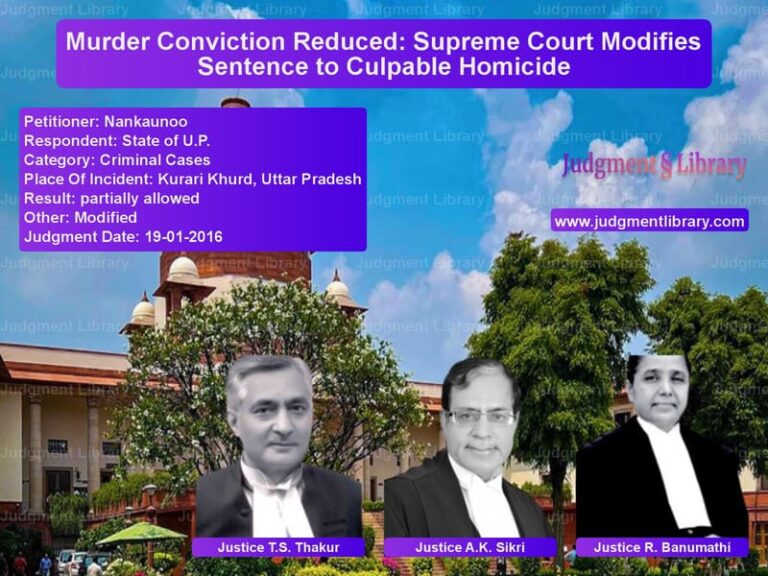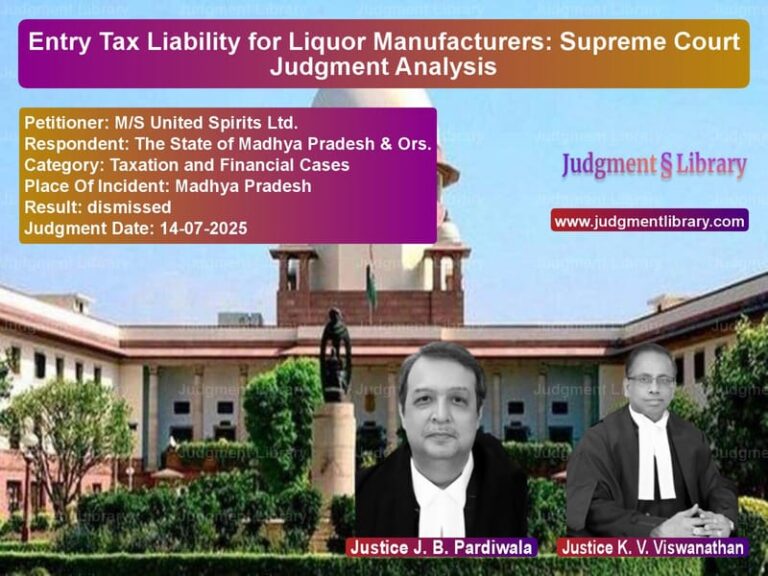Devraj v. State of Chhattisgarh: Legal Analysis of Murder Conviction in Land Dispute Case
This case concerns the appeal of Devraj, who was convicted for the murder of his cousin, Devi Prasad, under Section 302 of the Indian Penal Code. The appellant, Devraj, along with his brother Dinda @ Deenanath, was accused of murdering Devi Prasad after a land dispute. The trial court had convicted both Devraj and Dinda under Sections 302 and 201 of the IPC. The High Court upheld the conviction of Devraj under Section 302 but acquitted Dinda. Devraj has now filed an appeal before the Supreme Court, challenging his conviction and sentence.
Introduction:
The appellant, Devraj, along with his brother Dinda @ Deenanath, was involved in a land dispute with their cousin, Devi Prasad. On the evening of June 26, 2006, Devraj and Dinda allegedly intercepted Devi Prasad while he was riding a motorcycle with his associate, Ratan Singh Guruji, and assaulted him with sticks (geda and lathi). After the assault, they disposed of the body by throwing it under the Rakhet Pulia. The body was found the next morning, and an FIR was lodged by Devi Prasad’s wife, Anita Bai. The prosecution relied on eyewitness testimony and circumstantial evidence to convict Devraj and Dinda, though Dinda was later acquitted by the High Court. Devraj now appeals the High Court’s decision, arguing that the conviction was based on insufficient evidence.
Petitioner’s Arguments:
The appellant contends that the trial and High Court decisions were flawed, particularly the reliance on hostile witnesses and the lack of direct evidence linking him to the crime. The appellant argues that while some witnesses testified that Devraj had assaulted the deceased, their testimony was inconsistent and unreliable, especially after being cross-examined. He further claims that the charge under Section 302 (murder) was not substantiated by the evidence, as there was no conclusive proof that the injuries caused were sufficient to result in death. The appellant argues that the High Court’s conviction was based on weak circumstantial evidence, including the testimonies of witnesses who had been declared hostile. The appellant claims that the trial court’s acquittal of Dinda should have applied equally to him, as there was no clear distinction between the two in the available evidence.
Respondent’s Arguments:
The respondents, represented by the State of Chhattisgarh, argue that the conviction of Devraj was justified based on the overwhelming evidence, including eyewitness testimony, the motive for the crime, and circumstantial evidence. The respondents emphasize the consistency in the testimonies of key witnesses, particularly Ratan Singh Guruji, who stated that Devraj and Dinda were present at the scene and assaulted Devi Prasad. The respondents argue that despite the witnesses being declared hostile, their initial testimonies, which supported the prosecution’s case, were credible and should be relied upon. They also contend that the land dispute provided a clear motive for the crime, making it highly likely that Devraj committed the murder. The respondents assert that the trial court and the High Court correctly convicted Devraj, and there is no reason for the Supreme Court to overturn these findings.
The Court’s Analysis:
The Supreme Court reviewed the evidence presented, including the testimonies of witnesses and the medical evidence. The Court noted that while two key witnesses (Shivlochan and Ajar Das) were declared hostile, their testimonies in the examination-in-chief were consistent with the version provided by other eyewitnesses. The Court emphasized the importance of corroborating the testimony of hostile witnesses with other evidence, as stated in previous judgments such as Bhagwan Singh v. State of Haryana and Khujji v. State of M.P., where hostile witnesses’ evidence was relied upon if corroborated by other reliable material.
The Court also considered the medical evidence and the post-mortem report, which confirmed that the deceased had suffered fatal injuries. While the appellant’s defense suggested that the injuries could have been caused by an accident, the Court found this theory unconvincing, as the injuries were consistent with an assault. The Court noted that the location of the body and the condition of the motorcycle further supported the theory of murder rather than an accident. The Court found that the evidence pointed to Devraj’s involvement in the crime, particularly the eyewitness accounts of the assault and the motive arising from the land dispute.
The Court also addressed the appellant’s claim that the prosecution had failed to prove beyond reasonable doubt that the injuries inflicted by Devraj were sufficient to cause death. The Court referred to medical evidence that suggested the injuries could have been fatal, further bolstering the prosecution’s case. The Court concluded that the appellant’s actions met the criteria for a conviction under Section 302, as the killing was intentional and the result of a premeditated assault.
Conclusion:
The Supreme Court dismissed the appeal, affirming the conviction of Devraj under Section 302 of the Indian Penal Code. The Court found that the trial court and the High Court had properly evaluated the evidence and that the conviction was supported by reliable eyewitness testimony and corroborating circumstantial evidence. The Court rejected the appellant’s arguments regarding the insufficient evidence of murder and the claim of an accident. The Court also held that the testimony of hostile witnesses could be relied upon to the extent that it was corroborated by other evidence. The conviction and sentence were upheld, and the appeal was dismissed with no order as to costs.
Don’t miss out on the full details! Download the complete judgment in PDF format below and gain valuable insights instantly!
Download Judgment: Devraj vs State of Chhattisgar Supreme Court of India Judgment Dated 25-07-2016-1741873398027.pdf
Direct Downlaod Judgment: Direct downlaod this Judgment
See all petitions in Murder Cases
See all petitions in Attempt to Murder Cases
See all petitions in Fraud and Forgery
See all petitions in Judgment by Ashok Bhushan
See all petitions in Judgment by S. A. Bobde
See all petitions in dismissed
See all petitions in supreme court of India judgments July 2016
See all petitions in 2016 judgments
See all posts in Criminal Cases Category
See all allowed petitions in Criminal Cases Category
See all Dismissed petitions in Criminal Cases Category
See all partially allowed petitions in Criminal Cases Category







